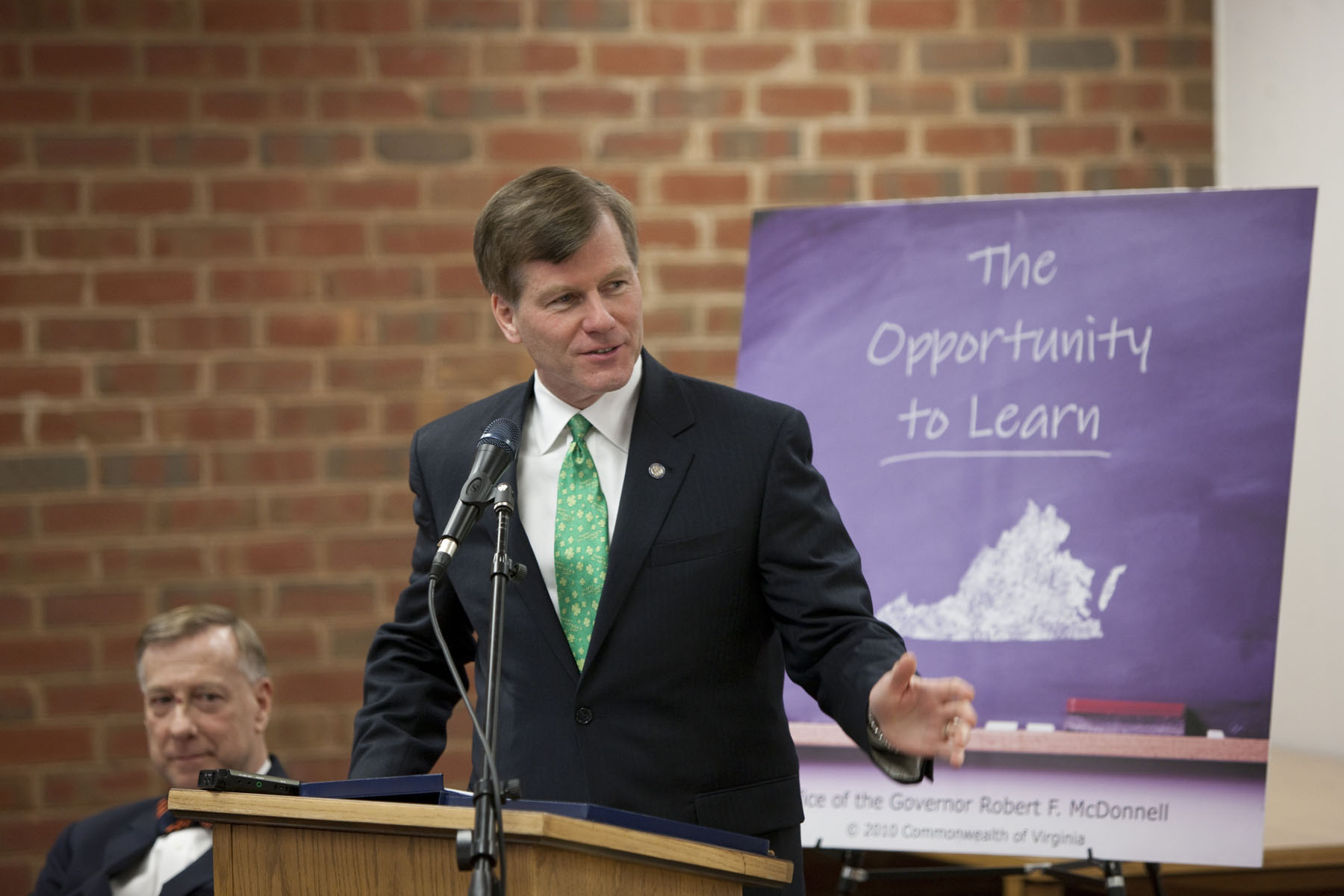March 18, 2009 — Virginia Gov. Robert McDonnell signed into law two bills providing funding for universities to create laboratory schools – allowing teachers to continue learning and providing students with innovative teaching techniques. The bills were signed Wednesday at the University of Virginia's Curry School of Education.
"It could not be more fitting that we are signing these bills at the University of Virginia – one of the nation's top universities and an institution that has expressed interest in opening up a college laboratory school," McDonnell said. "This University, and the Curry School of Education, are preparing the next generation of teachers and education leaders for our schools. This legislation will enhance that effort.
"A college partnership laboratory school at the University of Virginia will give public school students new opportunities to learn in a challenging environment, and will give teaching students at the University of Virginia invaluable classroom experience with K-12 students."
The signing took place in the Curry Library Innovation Commons.
Sandi Cohen, director of Curry's teacher education program, said the signing highlights Curry's emphasis on innovative teaching and learning techniques. "Lab schools will be another means by which we can provide an enhanced learning experience for our teacher education students," she said.
Lab schools have the potential to create benefits for both teachers and students, said Curry Dean Robert Pianta.
"The concept of college lab schools is a good one," he said. "It creates opportunities for innovative ways public schools can address the needs of students and teachers. Lab schools also create opportunities for professional preparation and training that not only benefits students from schools like Curry, but also the students being served in the lab schools."
While working in the lab schools, Curry's future teachers will have systematic support from both University faculty and practicing teachers. This support will allow for a deeper understanding of effective instructional practices and greater success in the classroom.
Lab schools also provide an environment to integrate into classroom instruction the content and research being developed at Curry, Cohen said.
Lab schools would be created through partnerships between Virginia colleges and universities with approved teacher education programs and local schools in their area.
"We are delighted to have this opportunity and look forward to building on the close partnerships we have with the local school divisions," Pianta said. "I think this is a great opportunity for all of Curry's programs that address so many aspects of schooling and human development."
"It could not be more fitting that we are signing these bills at the University of Virginia – one of the nation's top universities and an institution that has expressed interest in opening up a college laboratory school," McDonnell said. "This University, and the Curry School of Education, are preparing the next generation of teachers and education leaders for our schools. This legislation will enhance that effort.
"A college partnership laboratory school at the University of Virginia will give public school students new opportunities to learn in a challenging environment, and will give teaching students at the University of Virginia invaluable classroom experience with K-12 students."
The signing took place in the Curry Library Innovation Commons.
Sandi Cohen, director of Curry's teacher education program, said the signing highlights Curry's emphasis on innovative teaching and learning techniques. "Lab schools will be another means by which we can provide an enhanced learning experience for our teacher education students," she said.
Lab schools have the potential to create benefits for both teachers and students, said Curry Dean Robert Pianta.
"The concept of college lab schools is a good one," he said. "It creates opportunities for innovative ways public schools can address the needs of students and teachers. Lab schools also create opportunities for professional preparation and training that not only benefits students from schools like Curry, but also the students being served in the lab schools."
While working in the lab schools, Curry's future teachers will have systematic support from both University faculty and practicing teachers. This support will allow for a deeper understanding of effective instructional practices and greater success in the classroom.
Lab schools also provide an environment to integrate into classroom instruction the content and research being developed at Curry, Cohen said.
Lab schools would be created through partnerships between Virginia colleges and universities with approved teacher education programs and local schools in their area.
"We are delighted to have this opportunity and look forward to building on the close partnerships we have with the local school divisions," Pianta said. "I think this is a great opportunity for all of Curry's programs that address so many aspects of schooling and human development."
Media Contact
Article Information
March 18, 2010
/content/governor-comes-uva-sign-laws-allowing-universities-create-lab-schools

